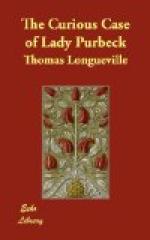Buckingham, at about the same time that he received Coke’s letter, received one in a very different tone from Bacon, in which he said:[19] “Secretary Winwood has busied himself with a match between Sir John Villiers & Sir Edward Coke’s daughter, rather to make a faction than out of any good affection to your lordship. The lady’s consent is not gained, nor her mother’s, from whom she expecteth a great fortune. This match, out of my faith & freedom to your lordship, I hold very inconvenient, both for your mother, brother, & yourself.”
“First. He shall marry into a disgraced house, which in reason of state, is never held good.”
“Next. He shall marry into a troubled house of man & wife, which in religion and Christian discretion is not liked.”
“Thirdly. Your lordship will go near to lose all such of your friends as are adverse to Sir Edward Coke (myself only except, who, out of a pure love & thankfulness, shall ever be firm to you).... Therefore, my advice is, & your lordship shall do yourself a great honour, if, according to religion & the law of God, your lordship will signify unto my lady, your mother, that your desire is that the marriage be not pressed or proceeded in without the consent of both parents, & so either break it altogether, or defer any further delay in it (sic) till your lordship’s return.”
A few days later, on the 25th of July, Bacon wrote to an even greater man than Buckingham, namely, to the King himself. “If,” said he, “there be any merit in drawing on this match, your Majesty should bestow thanks, not upon the zeal of Sir Edward Coke to your Majesty, nor upon the eloquent persuasions or pragmaticals of Mr. Secretary Winwood; but upon them”—meaning himself—who “have so humbled Sir Edward Coke, as he seeketh now that with submission which (as your Majesty knoweth) before he rejected with scorn.” And then he says that if the King really wishes for the match, concerning which he should like more definite orders, he will further it; for, says he, “though I will not wager on women’s minds, I can prevail more with the mother than any other man.”
King James’s reply is not in existence, and it is unknown; but, judging from a further letter of Bacon’s, it must have been rather cold and unfavourable; and, in Bacon’s second letter to the King, he was foolish enough to express a fear lest Buckingham’s “height of fortune might make him too secure.” In his answer to this second letter of Bacon, James reproves him for plotting with his adversary’s wife to overthrow him, saying “this is to be in league with Delilah.” He also scolds Bacon for being afraid that Buckingham’s height of fortune might make him “misknow himself.” The King protests that Buckingham is farther removed from such a vice than any of his other courtiers. Bacon, he says, ought to have written to the King instead of to Buckingham about “the inconvenience of the match:” “that would have been the part of a true servant to us, and of a true friend to him [Buckingham]. But first to make an opposition, then to give advice, by way of friendship, is to make the plough go before the horse.”




